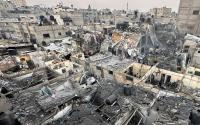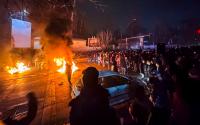10 January 2005Ali Abunimah
Mahmoud Abbas has claimed victory in the Palestinian presidential elections this weekend. We speak with Ali Abunimah, founder of Electronic Intifada, who says, "Many Palestinians fear this is another setup so when the inevitable failure brought about by Israeli intransigence occurs, this will be another opportunity to blame the Palestinians, and accuse them of missing an opportunity once again." [includes rush transcript] --------------------------------------------------------------------------------Mahmoud Abbas has claimed victory in the second-ever Palestinian presidential election in the occupied West Bank, Gaza Strip and East Jerusalem. Though official results will not be released until later today, Abbas, the frontrunner and the chairman of the Palestine Liberation Organization, appeared to receive 65 percent of the vote. Addressing hundreds of at a rally in the West Bank town of Ramallah, he said: "I present this victory to the soul of Yasser Arafat and present it to our people, to our martyrs and to 11,000 prisoners" in Israeli jails.
International monitors said the ballot appeared to have been fair despite problems with registration, heavy turnout and the turning away of hundreds of voters from a big Israeli-run polling station in East Jerusalem.
The elections commission said that around 70 percent of the 1.28 million registered voters cast their ballots. But Agence France Presse reports that only around 10 percent of the other 700,000 Palestinians who were not on the register but who could still vote by presenting their identity card did so. That would leave the overall turnout among people eligible to vote below 50 percent.
Pro-democracy activist and independent candidate Mustafa Barghouthi came in second with about 20 percent of the votes. At a press conference, Barghouti warned that that Palestinian security forces and others may have cast multiple ballots:
Mustafa Barghouti: "So far, til five o clock or actually til 5:30 maybe, nobody could vote without having their name in the registration lists. After 5:30 the central election commission have informed orally and practised and allowed voting in several election places without being registered in the list. This means there is a very serious risk that people could vote more than once."
Meanwhile, the militant group Hamas says it will work with Abbas despite previously calling for a boycott of the vote.
Ali Abunimah, founder of Electronic Intifada.
--------------------------------------------------------------------------------RUSH TRANSCRIPT This transcript is available free of charge, however donations help us provide closed captioning for the deaf and hard of hearing on our TV broadcast. Thank you for your generous contribution. Donate - $25, $50, $100, more...
AMY GOODMAN: At a news conference, Barghouti warned that Palestinian security forces and others may have cast multiple ballots.
MUSTAFA BARGHOUTI: And so far, until 5:00, or actually until 5:30, maybe, nobody could vote without having their name in the registration lists. After 5:30, the central election commission has informed orally and practice and allowed voting in several election places without being registered in their lists. This means that there is a serious risk that we could have.
AMY GOODMAN: Independent presidential candidate, Dr. Mustaffa Barghouti. The militant group, Hamas says it will work with Abbas despite briefly calling for a boycott of the vote. Joining us on the phone is Ali Abunimah the founder of Electronic Intifada.
ALI ABUNIMAH: Thank you, Amy.
AMY GOODMAN: Good to have you us with. Your response to the presidential election.
ALI ABUNIMAH: Well, the reports that I have been hear, and I was talking to people in Palestine all day, and Gaza and the West Bank, is that there were significant irregularities in many, many areas. The impression, I think, many Palestinians have is that the media, the US government, the herd of international monitors who went over there to certify the victory decided in advance that the election had to be treated as good news, and they're not interested in what actually is happening to Palestinians both in the context of the election and the much bigger context of the continued Israeli assault. And the fact that while we're all distracted by this election, Al-Harat Saturday published a lengthy report that while we're all looking at the election, Israel is quietly expanding its settlements throughout the occupied west bank with the full approval of the United States, and in particular, of Condoleezza Rice, the incoming US Secretary of State. So, the false optimism created by this victory for Abbas, all of the pundits who say this is a new dawn, a new opening for peace, really many Palestinians fear this is another setup so when the inevitable failure brought about by Israeli intransigence occurs, this will be another opportunity to blame the Palestinians, and accuse them of missing an opportunity once again.
AMY GOODMAN: And what about what happens next, and particularly, Hamas's role, at first calling for a boycott, but then saying they'll support Mahmoud Abbas?
ALI ABUNIMAH: One of the problems is that, you know, most Palestinians have not really heard of Mahmoud Abbas until George Bush anointed him the moderate leader. And understand -- under Bush's pressure, Abbas was appointed as Palestinian prime minister a while back. So, you know, there was this juggernaut to have Abbas elected in Arafat's place, that I think Hamas realize this is a political reality, and all of the Palestinian factions, Hamas, as well as all of the others, have always put a premium on avoiding any semblance or any emergence of a Palestinian civil war, of Palestinians turning on each other. So, I think that one of the silver linings of this contest is that it showed that Palestinians unsurprisingly are capable of political life, a very vigorous ideological and political disagreement without any hint of violence or conflict among each other, and I think that's what Hamas is primarily attempting to demonstrate.
AMY GOODMAN: There was controversy on some of the networks showing the Al Aqsa Martyr's Brigade holding up Mahmoud Abbas.
ALI ABUNIMAH: Well, this demonstrates the reality that the pundits and the international peace process industry wants to remove this election from the context in which it's taking place under the continued heel of Israel's military tyranny. From Palestinians whose land is be demolished and land is being taken, the US media is paying no attention whatsoever. For many, many Palestinians that I talked to who said there's an overwhelming mood that this election makes no difference to them, that they don't see that Mahmoud Abbas or anyone else elected has the power to change the reality that Israel has imposed on them. So, in that context, of course, there's going to be resistance, and Abbas can't ignore that. He can't just turn around and appeal to the Israeli and American audience and ignore the context in which his people are living. So, he's going to be caught in a trap now where the Israelis and Americans are going to put impossible demands on him that while Israel continues to confiscate land, continues to build colonies, Abbas's job is going to be to carry out political assassinations of Palestinian resistance leaders on behalf of the occupation to arrest Palestinians and put them in prison, if they express any opposition or resistance to what Israel is doing, and if Abbas fails to do that, he is going to be called a terrorist, Israel is going to use this as an excuse not to enter into any peace talks, and I think it's very significant, this report in Al Haaretz Saturday that is not getting any airing in the US, that the US has explicitly approved Israel's plans for construction in 120 settlements across the occupied west bank, and that the United States government is quietly working with Israel to delineate where this settlement construction is taking place, and Al Haaretz quotes an Israeli official who says the following, "to explain why the US is helping Israel with the settlements," he says, "if the US recognizes your claim that the settlement block also remain yours forever, why should it make amendments when you build on your own property?" according to peace now, the Israeli group that documents Israeli settlement activity, they're quoted as saying, "the main building effort in the Jewish settlements in the west bank is now focused on the area between the green line and the separation fence, and it is aimed at turning the fence into Israel's permanent border." In other words, what we have been saying all along is coming true, that the apartheid wall or separation fence as Israelis call it is really a land grab with the US support, Israel is rushing to completely colonize the area between the 1967 line and the apartheid wall and create facts on the ground that will leave Palestinians completely isolated in reservations, and if the Palestinians want to elect a -- an obedient native lead to rule over them in their reservations, then the Israelis and Americans will support them in doing that, and that's the message that many Palestinians, particularly those in the diaspora, millions of Palestinian refugees, who have been absolutely excluded from this election, in contrast to Iraqis and Afghans who are being encouraged to participate, Palestinian refugees have been completely cut off from this process, and it seems that the Americans, the EU, and as I have called it, the peace process industry see in Abbas someone who will be willing to compromise on fundamental Palestinian rights. And I think they're going to be very disappointed because they're going to find out that simply putting a nice guy in a suit and sitting down with him doesn't change any of the basic realities of the conflict. So, all of this optimistic talk of a window of opportunity is going to come to absolutely nothing, and the greater danger, of course, for Palestinians is that they're going to be blamed once again for the impasse. They're going to be told, look, we helped you with the election. Everyone supported you. Jimmy Carter came in. Senator Joseph Bidden, all of these people flocked to the occupied territories to certify the election, and when it fails, because of Israel's intransigence and continued colonization policies and violence, the Palestinians are going to be blamed.
AMY GOODMAN: I want to thank you for being with us, Ali Abunimah of Electronic Intifada. This is Democracy Now!
To purchase an audio or video copy of this entire program, click here for our new online ordering or call 1 (800) 881-2359. http://www.democracynow.org/article.pl?sid=05/01/10/1456224






